Most Important People in World War II
The Top Ten
1 Josip Broz Tito
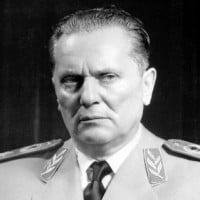 Josip Broz (7 May 1892, Kumrovec – 4 May 1980, Ljubljana), commonly known as Tito, was a Yugoslav communist revolutionary and statesman, serving in various roles until his death in 1980. During World War II he was the leader of the Partisans, often regarded as the most effective resistance movement in occupied Europe.
Josip Broz (7 May 1892, Kumrovec – 4 May 1980, Ljubljana), commonly known as Tito, was a Yugoslav communist revolutionary and statesman, serving in various roles until his death in 1980. During World War II he was the leader of the Partisans, often regarded as the most effective resistance movement in occupied Europe.
 Josip Broz (7 May 1892, Kumrovec – 4 May 1980, Ljubljana), commonly known as Tito, was a Yugoslav communist revolutionary and statesman, serving in various roles until his death in 1980. During World War II he was the leader of the Partisans, often regarded as the most effective resistance movement in occupied Europe.
Josip Broz (7 May 1892, Kumrovec – 4 May 1980, Ljubljana), commonly known as Tito, was a Yugoslav communist revolutionary and statesman, serving in various roles until his death in 1980. During World War II he was the leader of the Partisans, often regarded as the most effective resistance movement in occupied Europe. Led the Communists in Yugoslavia towards the anti-Nazi coup and later during the fight against Nazis. The anti-Nazi coup (27th March 1941) prolonged Hitler's plans for the invasion of the USSR, so Hitler was in Moscow not by autumn but by winter so he was pushed back and later on - defeated.
Because he raised partisan army hitler had to send tank divisions and huge army which was originally going to defeat Russia. So Russia had enough time to create resistance and coupled with coming of winter they defeated germans
Legendary and indestructible leader of resistance to the Nazis!
Communist partisans>French resistance
2 Adolf Hitler
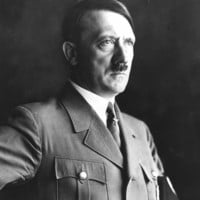 Adolf Hitler (April 20, 1889 - April 30, 1945) was a German politician of Austrian descent who served as the leader of the Nazi Party since 1921, Chancellor of Germany since 1933, and Führer of Nazi Germany since 1934. As dictator of Nazi Germany, he reversed the Treaty of Versailles, initiated World War II in Europe with the invasion of Poland in September 1939, and was a central figure of the Holocaust. He committed suicide two days before Soviet soldiers stormed his underground shelter in Berlin.
Adolf Hitler (April 20, 1889 - April 30, 1945) was a German politician of Austrian descent who served as the leader of the Nazi Party since 1921, Chancellor of Germany since 1933, and Führer of Nazi Germany since 1934. As dictator of Nazi Germany, he reversed the Treaty of Versailles, initiated World War II in Europe with the invasion of Poland in September 1939, and was a central figure of the Holocaust. He committed suicide two days before Soviet soldiers stormed his underground shelter in Berlin.
 Adolf Hitler (April 20, 1889 - April 30, 1945) was a German politician of Austrian descent who served as the leader of the Nazi Party since 1921, Chancellor of Germany since 1933, and Führer of Nazi Germany since 1934. As dictator of Nazi Germany, he reversed the Treaty of Versailles, initiated World War II in Europe with the invasion of Poland in September 1939, and was a central figure of the Holocaust. He committed suicide two days before Soviet soldiers stormed his underground shelter in Berlin.
Adolf Hitler (April 20, 1889 - April 30, 1945) was a German politician of Austrian descent who served as the leader of the Nazi Party since 1921, Chancellor of Germany since 1933, and Führer of Nazi Germany since 1934. As dictator of Nazi Germany, he reversed the Treaty of Versailles, initiated World War II in Europe with the invasion of Poland in September 1939, and was a central figure of the Holocaust. He committed suicide two days before Soviet soldiers stormed his underground shelter in Berlin. He Caused This Horrible Time In History
3 Josef Stalin
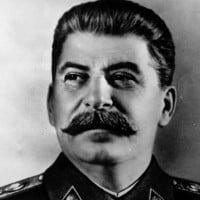 Joseph Vissarionovich Stalin was a Georgian dictator, and was the leader of the Soviet Union from the mid-1920s until his death in 1953. Holding the post of the General Secretary of the Central Committee of the Communist Party of the Soviet Union, he was effectively the dictator of the state.
Joseph Vissarionovich Stalin was a Georgian dictator, and was the leader of the Soviet Union from the mid-1920s until his death in 1953. Holding the post of the General Secretary of the Central Committee of the Communist Party of the Soviet Union, he was effectively the dictator of the state.
 Joseph Vissarionovich Stalin was a Georgian dictator, and was the leader of the Soviet Union from the mid-1920s until his death in 1953. Holding the post of the General Secretary of the Central Committee of the Communist Party of the Soviet Union, he was effectively the dictator of the state.
Joseph Vissarionovich Stalin was a Georgian dictator, and was the leader of the Soviet Union from the mid-1920s until his death in 1953. Holding the post of the General Secretary of the Central Committee of the Communist Party of the Soviet Union, he was effectively the dictator of the state.
4 Benito Mussolini
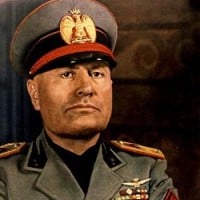 Benito Amilcare Andrea Mussolini was an Italian politician, journalist, and leader of the National Fascist Party, ruling the country as Prime Minister from 1922 until he was ousted in 1943. He ruled constitutionally until 1925, when he dropped all pretense of democracy and set up a legal dictatorship.
Benito Amilcare Andrea Mussolini was an Italian politician, journalist, and leader of the National Fascist Party, ruling the country as Prime Minister from 1922 until he was ousted in 1943. He ruled constitutionally until 1925, when he dropped all pretense of democracy and set up a legal dictatorship.
 Benito Amilcare Andrea Mussolini was an Italian politician, journalist, and leader of the National Fascist Party, ruling the country as Prime Minister from 1922 until he was ousted in 1943. He ruled constitutionally until 1925, when he dropped all pretense of democracy and set up a legal dictatorship.
Benito Amilcare Andrea Mussolini was an Italian politician, journalist, and leader of the National Fascist Party, ruling the country as Prime Minister from 1922 until he was ousted in 1943. He ruled constitutionally until 1925, when he dropped all pretense of democracy and set up a legal dictatorship.
5 Hermann Göring
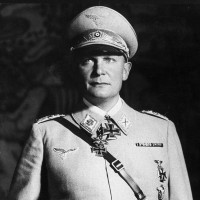 Hermann Wilhelm Göring (12 January 1893 - 15 October 1946) was a German politician, military leader, and leading member of the Nazi Party. He attended the Prussian Cadet Corps to become an officer. In World War I, his success as a fighter pilot was honored with the highest German military order, Pour le Mérite... read more
Hermann Wilhelm Göring (12 January 1893 - 15 October 1946) was a German politician, military leader, and leading member of the Nazi Party. He attended the Prussian Cadet Corps to become an officer. In World War I, his success as a fighter pilot was honored with the highest German military order, Pour le Mérite... read more
 Hermann Wilhelm Göring (12 January 1893 - 15 October 1946) was a German politician, military leader, and leading member of the Nazi Party. He attended the Prussian Cadet Corps to become an officer. In World War I, his success as a fighter pilot was honored with the highest German military order, Pour le Mérite... read more
Hermann Wilhelm Göring (12 January 1893 - 15 October 1946) was a German politician, military leader, and leading member of the Nazi Party. He attended the Prussian Cadet Corps to become an officer. In World War I, his success as a fighter pilot was honored with the highest German military order, Pour le Mérite... read more
6 Joseph Goebbels
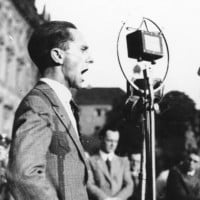 Joseph Goebbels (29 October 1897 – 1 May 1945) was a German Nazi politician and Reich Minister of Propaganda of Nazi Germany from 1933 to 1945.
Joseph Goebbels (29 October 1897 – 1 May 1945) was a German Nazi politician and Reich Minister of Propaganda of Nazi Germany from 1933 to 1945.
 Joseph Goebbels (29 October 1897 – 1 May 1945) was a German Nazi politician and Reich Minister of Propaganda of Nazi Germany from 1933 to 1945.
Joseph Goebbels (29 October 1897 – 1 May 1945) was a German Nazi politician and Reich Minister of Propaganda of Nazi Germany from 1933 to 1945.
7 Heinrich Himmler
 Heinrich Himmler was a German dictator, and a leading member of the Nazi party. Himmler was one of the most powerful men in Nazi Germany and one of the people most directly responsible for the Holocaust.
Heinrich Himmler was a German dictator, and a leading member of the Nazi party. Himmler was one of the most powerful men in Nazi Germany and one of the people most directly responsible for the Holocaust.
 Heinrich Himmler was a German dictator, and a leading member of the Nazi party. Himmler was one of the most powerful men in Nazi Germany and one of the people most directly responsible for the Holocaust.
Heinrich Himmler was a German dictator, and a leading member of the Nazi party. Himmler was one of the most powerful men in Nazi Germany and one of the people most directly responsible for the Holocaust.
8 Ernst Kaltenbrunner


9 Reinhard Heydrich
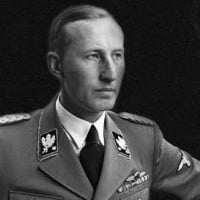

10 Franklin D Roosevelt
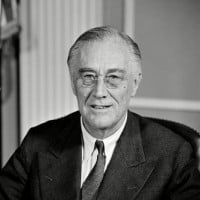 Franklin Delano Roosevelt, commonly known as FDR, was an American statesman and political leader who served as the 32nd President of the United States from 1933 to 1945. A Democrat, he won a record four presidential elections and dominated his party for many years as a central figure in world events during the mid-20th century, leading the United States during a time of worldwide economic depression and total war.
Franklin Delano Roosevelt, commonly known as FDR, was an American statesman and political leader who served as the 32nd President of the United States from 1933 to 1945. A Democrat, he won a record four presidential elections and dominated his party for many years as a central figure in world events during the mid-20th century, leading the United States during a time of worldwide economic depression and total war.
 Franklin Delano Roosevelt, commonly known as FDR, was an American statesman and political leader who served as the 32nd President of the United States from 1933 to 1945. A Democrat, he won a record four presidential elections and dominated his party for many years as a central figure in world events during the mid-20th century, leading the United States during a time of worldwide economic depression and total war.
Franklin Delano Roosevelt, commonly known as FDR, was an American statesman and political leader who served as the 32nd President of the United States from 1933 to 1945. A Democrat, he won a record four presidential elections and dominated his party for many years as a central figure in world events during the mid-20th century, leading the United States during a time of worldwide economic depression and total war.The Contenders
11 Winston Churchill
 Sir Winston Leonard Spencer-Churchill was a British statesman who was the Prime Minister of the United Kingdom from 1940 to 1945 and again from 1951 to 1955. Churchill was also an officer in the British Army, a historian, and a writer.
Sir Winston Leonard Spencer-Churchill was a British statesman who was the Prime Minister of the United Kingdom from 1940 to 1945 and again from 1951 to 1955. Churchill was also an officer in the British Army, a historian, and a writer.
 Sir Winston Leonard Spencer-Churchill was a British statesman who was the Prime Minister of the United Kingdom from 1940 to 1945 and again from 1951 to 1955. Churchill was also an officer in the British Army, a historian, and a writer.
Sir Winston Leonard Spencer-Churchill was a British statesman who was the Prime Minister of the United Kingdom from 1940 to 1945 and again from 1951 to 1955. Churchill was also an officer in the British Army, a historian, and a writer. Inspiring, giving hope and saw it right,
12 Wilhelm Keitel
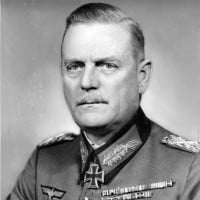

13 Harry Truman
 Harry S. Truman was the 33rd President of the United States, an American politician of the Democratic Party.
Harry S. Truman was the 33rd President of the United States, an American politician of the Democratic Party.
 Harry S. Truman was the 33rd President of the United States, an American politician of the Democratic Party.
Harry S. Truman was the 33rd President of the United States, an American politician of the Democratic Party.
14 General Hideki Tojo
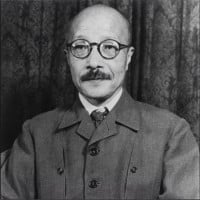

He ordered pearl harbor
15 Dwight D. Eisenhower
 Dwight David "Ike" Eisenhower was an American politician and general who served as the 34th President of the United States from 1953 until 1961. He was a five-star general in the United States Army during World War II and served as Supreme Commander of the Allied Forces in Europe.
Dwight David "Ike" Eisenhower was an American politician and general who served as the 34th President of the United States from 1953 until 1961. He was a five-star general in the United States Army during World War II and served as Supreme Commander of the Allied Forces in Europe.
 Dwight David "Ike" Eisenhower was an American politician and general who served as the 34th President of the United States from 1953 until 1961. He was a five-star general in the United States Army during World War II and served as Supreme Commander of the Allied Forces in Europe.
Dwight David "Ike" Eisenhower was an American politician and general who served as the 34th President of the United States from 1953 until 1961. He was a five-star general in the United States Army during World War II and served as Supreme Commander of the Allied Forces in Europe.
16 Hirohito
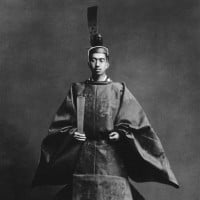 Emperor Hirohito was the 124th Emperor of Japan according to the traditional order of succession, reigning from 25 December 1926, until his death on 7 January 1989. He was succeeded by his eldest son, Akihito. In Japan, he is now referred to primarily by his posthumous name, Emperor Shōwa.
Emperor Hirohito was the 124th Emperor of Japan according to the traditional order of succession, reigning from 25 December 1926, until his death on 7 January 1989. He was succeeded by his eldest son, Akihito. In Japan, he is now referred to primarily by his posthumous name, Emperor Shōwa.
 Emperor Hirohito was the 124th Emperor of Japan according to the traditional order of succession, reigning from 25 December 1926, until his death on 7 January 1989. He was succeeded by his eldest son, Akihito. In Japan, he is now referred to primarily by his posthumous name, Emperor Shōwa.
Emperor Hirohito was the 124th Emperor of Japan according to the traditional order of succession, reigning from 25 December 1926, until his death on 7 January 1989. He was succeeded by his eldest son, Akihito. In Japan, he is now referred to primarily by his posthumous name, Emperor Shōwa.
17 Irena Sendler
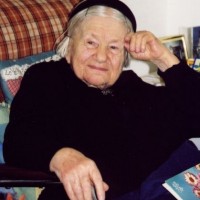

18 Charles de Gaulle
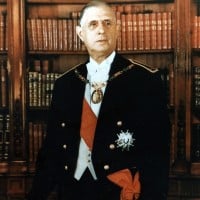 Charles André Joseph Marie de Gaulle (22 November 1890 – 9 November 1970) was a French general and statesman. He was the leader of Free France (1940–44) and the head of the Provisional Government of the French Republic (1944–46). In 1958, he founded the Fifth Republic and was elected as the 18th President of France, a position he held until his resignation in 1969. He was the dominant figure of France during the Cold War era and his memory continues to influence French politics.
Charles André Joseph Marie de Gaulle (22 November 1890 – 9 November 1970) was a French general and statesman. He was the leader of Free France (1940–44) and the head of the Provisional Government of the French Republic (1944–46). In 1958, he founded the Fifth Republic and was elected as the 18th President of France, a position he held until his resignation in 1969. He was the dominant figure of France during the Cold War era and his memory continues to influence French politics.
 Charles André Joseph Marie de Gaulle (22 November 1890 – 9 November 1970) was a French general and statesman. He was the leader of Free France (1940–44) and the head of the Provisional Government of the French Republic (1944–46). In 1958, he founded the Fifth Republic and was elected as the 18th President of France, a position he held until his resignation in 1969. He was the dominant figure of France during the Cold War era and his memory continues to influence French politics.
Charles André Joseph Marie de Gaulle (22 November 1890 – 9 November 1970) was a French general and statesman. He was the leader of Free France (1940–44) and the head of the Provisional Government of the French Republic (1944–46). In 1958, he founded the Fifth Republic and was elected as the 18th President of France, a position he held until his resignation in 1969. He was the dominant figure of France during the Cold War era and his memory continues to influence French politics.
19 Alan Turing
 Alan Mathison Turing was a pioneering English computer scientist, mathematician, logician, cryptanalyst and theoretical biologist.
Alan Mathison Turing was a pioneering English computer scientist, mathematician, logician, cryptanalyst and theoretical biologist.
 Alan Mathison Turing was a pioneering English computer scientist, mathematician, logician, cryptanalyst and theoretical biologist.
Alan Mathison Turing was a pioneering English computer scientist, mathematician, logician, cryptanalyst and theoretical biologist.
20 Joe Louis
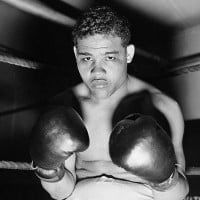

21 Calvin Graham
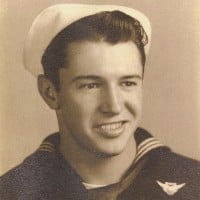

22 Anne Frank
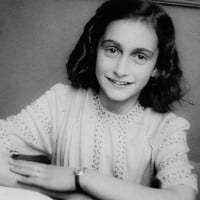 Annelies Marie Frank was a German-born diarist. Anne for short. One of the most discussed Jewish victims of the Holocaust, she gained fame posthumously with the publication of The Diary of a Young Girl in which she documents her life in hiding from 1942 to 1944, during the German occupation of the Netherlands in World War II. She was discovered with her group and arrested on August 4th, 1944. She survived Aushewiz, but was told to be moved to Bergen-Belsen Coculation Camp afterwards. There, she and her sister, Margot Betti Frank, died in the March of 1945 from Typhus.
Annelies Marie Frank was a German-born diarist. Anne for short. One of the most discussed Jewish victims of the Holocaust, she gained fame posthumously with the publication of The Diary of a Young Girl in which she documents her life in hiding from 1942 to 1944, during the German occupation of the Netherlands in World War II. She was discovered with her group and arrested on August 4th, 1944. She survived Aushewiz, but was told to be moved to Bergen-Belsen Coculation Camp afterwards. There, she and her sister, Margot Betti Frank, died in the March of 1945 from Typhus.
 Annelies Marie Frank was a German-born diarist. Anne for short. One of the most discussed Jewish victims of the Holocaust, she gained fame posthumously with the publication of The Diary of a Young Girl in which she documents her life in hiding from 1942 to 1944, during the German occupation of the Netherlands in World War II. She was discovered with her group and arrested on August 4th, 1944. She survived Aushewiz, but was told to be moved to Bergen-Belsen Coculation Camp afterwards. There, she and her sister, Margot Betti Frank, died in the March of 1945 from Typhus.
Annelies Marie Frank was a German-born diarist. Anne for short. One of the most discussed Jewish victims of the Holocaust, she gained fame posthumously with the publication of The Diary of a Young Girl in which she documents her life in hiding from 1942 to 1944, during the German occupation of the Netherlands in World War II. She was discovered with her group and arrested on August 4th, 1944. She survived Aushewiz, but was told to be moved to Bergen-Belsen Coculation Camp afterwards. There, she and her sister, Margot Betti Frank, died in the March of 1945 from Typhus.
23 Mao Zedong
 Mao Zedong, also transliterated as Mao Tse-tung and commonly referred to as Chairman Mao, was a Chinese communist revolutionary and founding father of the People's Republic of China, which he governed as Chairman of the Communist Party of China from its establishment in 1949, until his death in 1976. His Marxist–Leninist theories, military strategies, and political policies are collectively known as Maoism or Marxism–Leninism–Maoism.
Mao Zedong, also transliterated as Mao Tse-tung and commonly referred to as Chairman Mao, was a Chinese communist revolutionary and founding father of the People's Republic of China, which he governed as Chairman of the Communist Party of China from its establishment in 1949, until his death in 1976. His Marxist–Leninist theories, military strategies, and political policies are collectively known as Maoism or Marxism–Leninism–Maoism.
 Mao Zedong, also transliterated as Mao Tse-tung and commonly referred to as Chairman Mao, was a Chinese communist revolutionary and founding father of the People's Republic of China, which he governed as Chairman of the Communist Party of China from its establishment in 1949, until his death in 1976. His Marxist–Leninist theories, military strategies, and political policies are collectively known as Maoism or Marxism–Leninism–Maoism.
Mao Zedong, also transliterated as Mao Tse-tung and commonly referred to as Chairman Mao, was a Chinese communist revolutionary and founding father of the People's Republic of China, which he governed as Chairman of the Communist Party of China from its establishment in 1949, until his death in 1976. His Marxist–Leninist theories, military strategies, and political policies are collectively known as Maoism or Marxism–Leninism–Maoism.
24 Bernard Montgomery
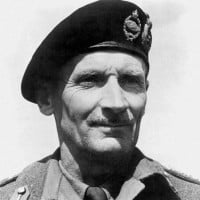

25 J. Robert Oppenheimer
 J. Robert Oppenheimer was an American theoretical physicist who was professor of physics at the University of California, Berkeley. Oppenheimer was the wartime head of the Los Alamos Laboratory and is among those who are credited with being the "father of the atomic bomb" for their role in the Manhattan Project – the World War II undertaking that developed the first nuclear weapons. Oppenheimer... read more
J. Robert Oppenheimer was an American theoretical physicist who was professor of physics at the University of California, Berkeley. Oppenheimer was the wartime head of the Los Alamos Laboratory and is among those who are credited with being the "father of the atomic bomb" for their role in the Manhattan Project – the World War II undertaking that developed the first nuclear weapons. Oppenheimer... read more
 J. Robert Oppenheimer was an American theoretical physicist who was professor of physics at the University of California, Berkeley. Oppenheimer was the wartime head of the Los Alamos Laboratory and is among those who are credited with being the "father of the atomic bomb" for their role in the Manhattan Project – the World War II undertaking that developed the first nuclear weapons. Oppenheimer... read more
J. Robert Oppenheimer was an American theoretical physicist who was professor of physics at the University of California, Berkeley. Oppenheimer was the wartime head of the Los Alamos Laboratory and is among those who are credited with being the "father of the atomic bomb" for their role in the Manhattan Project – the World War II undertaking that developed the first nuclear weapons. Oppenheimer... read more8Load More
PSearch List